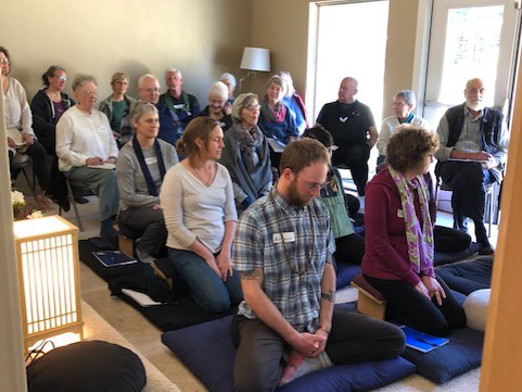About Practice at Sangha Jewel Zen Center
A fundamental practice of Zen Buddhism is meditation, or zazen. In essence, zazen is being present, without adding like or dislike, grasping or aversion to our immediate experience.
Zazen is not a means to an end, but the ongoing practice of freedom from suffering. By keeping a spacious mind through whatever physical sensations, thoughts, and emotions arise, we see their fleeting quality and non-attachment and satisfaction develop. Thus, we become increasingly able to flow with the inevitable changes and difficulties that life brings.
Zen Practice is also a way of becoming more intimately present and engaged with our life, in all of our activities. We must admit that much of our life is spent lost in thought. We miss the present when we are distracted by worries about the future, regrets about the past, or fantasies.
The ability to be zestfully engaged in our life can be cultivated and grown over time, and Zen practice seeks to do just that. Through our wholehearted engagement with life, the imagined barriers between self and other drop away, we begin to find joy in taking care of the world.
Over time we become intimate with the truth that everything we experience is our own life, which is fine, just as it is. From this perspective nothing that happens is a problem, just something to respond to. This response can be made from a place of choice, and being able to make a choice about our response, even in difficult situations, is liberating. This is guided by our practice of the Bodhisattva precepts (below), so that our growing freedom is balanced by self-discipline and a concern for the benefit of others.
Precepts
The heart of our practice is zazen (meditation) and ethics. The ethical foundation of Zen Buddhism is based on recognizing the interdependent nature of all life. We express this when we live according to the Five Precepts which we uphold—through active and ongoing work in our life. The precepts help us take responsibility for our own life and to cultivate the right way of living through body, speech and mind.
The Precepts are the way an enlightened person lives. We work with the Precepts by observing the consequences of upholding them or falling short of them, noticing that stress and difficulties decrease when we uphold them and increase when we don’t.
Receiving the Five Precepts is vowing to do our best to be an ethical human being. We do this by making vows—to cherish living beings, tell the truth, not steal, be sexually responsible, and avoid intoxication.
The Precepts are balanced with both negative and positive aspects. We not only intend to avoid unskillfulness, but we also vow to act in a positive way.
The Five Precepts are common to all spiritual and religious traditions.
The Five Precepts
I vow not to kill, but to cherish all life.
I vow not to steal, but to respect the things of others.
I vow not to lie, but to speak the truth.
I vow not to misuse sexual energy, but to be respectful in mind and action.
I vow not to misuse drugs or alcohol, but to keep the mind clear.
The Five Precepts are received at a ceremony before the community as a way to seal our commitment and receive community support for our intentions.
Preparation
Precepts classes
This is a series of five classes where a small group is able to explore the many facets and complexities of the precepts and their embodiment in everyday life. Classes are offered at Sangha Jewel Zen Center.
Precepts writing
Each person writes about their personal exploration and understanding of the precepts.
Sewing a wagesa
Each person hand sews a wagesa, a strip of cloth symbolizing the Buddha’s robe. After receiving the five precepts, the wagesa is worn while meditating, on retreats, and at other community functions, as an outward expression of our vows.
The Sixteen Bodhisattva Precepts
People receive the Sixteen Bodhisattva Precepts during the Jukai Ceremony. Choose “Jukai” from the about menu to learn more about it.
The Three Refuges (Three Treasures)
I take refuge in the Buddha.
I take refuge in the Dharma.
I take refuge in the Sangha.
The Three Pure Precepts
I vow not to commit evil.
I vow to cultivate goodness.
I vow to help others.
The Ten Grave Precepts
I vow not to kill, but to cherish all life.
I vow not to steal, but to respect that which belongs to others.
I vow not to misuse sexual energy, but to be honest and respectful in relationships.
I vow not to lie, but to speak the truth.
I vow not to misuse drugs or alcohol, but to keep the mind clear.
I vow not to gossip about others’ faults, but to be understanding and sympathetic.
I vow not to praise myself by criticizing others, but to overcome my own shortcomings.
I vow not to withhold spiritual or material aid, but to give freely when needed.
I vow not to unleash anger, but to seek its source.
I vow not to speak ill of the Three Treasures, but to cherish and uphold them.
Adapted from https://www.zendust.org/

